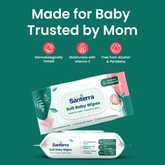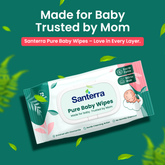Product Sustainability Analysis
Scope & Approach
This qualitative assessment covers primary materials, formulation choices, packaging, and end‑of‑life guidance for Santerra wipes and tissue products.
Wipes (Baby & Multipurpose)
Materials: Biodegradable spunlace (viscose and/or bamboo). Benefits: soft handfeel, strong when wet, compost‑friendly fabric under suitable conditions.
Formulation: High‑water content (~98–99%), skin humectants, and approved preservative systems; no parabens/phthalates. Potential improvements: fragrance‑free variants; RSPO‑certified emollients where used.
Packaging: Film pouches with resealable lids. Improvement roadmap: thinner films, recyclable mono‑material options, PCR content trials subject to barrier performance.
EOL: Do not flush. Dispose in trash. Fabric biodegradation depends on conditions (industrial composting faster than landfill).
Tissues (Facial, Toilet, Kitchen)
Materials: FSC‑certified or responsibly sourced pulp; 2‑ply/3‑ply. Benefits: compostable paper substrate. Improvement roadmap: increase recycled content where product performance allows.
Packaging: Shrink films and paper wraps; aim to reduce plastic thickness and increase recyclability.
EOL: Recycle clean cores and cartons; soiled paper typically not recyclable.
Risk & Opportunity Summary
Risks: packaging recyclability limits; supply variability; greenwashing risk without data. Opportunities: certified inputs, mono‑material packaging, lab testing transparency, supplier scorecards.
KPIs & Next Steps
KPIs: % biodegradable fabric by weight; % certified pulp; g plastic/pack; supplier audit completion.
Next: collect primary data from vendors; publish yearly progress; pilot recyclable film with select SKUs.
Santerra Hygiene Pvt Ltd • U‑MZ‑9, Bansi Trade Centre, MG Road, Indore – MP • www.santerrahygiene.com
- Choosing a selection results in a full page refresh.




